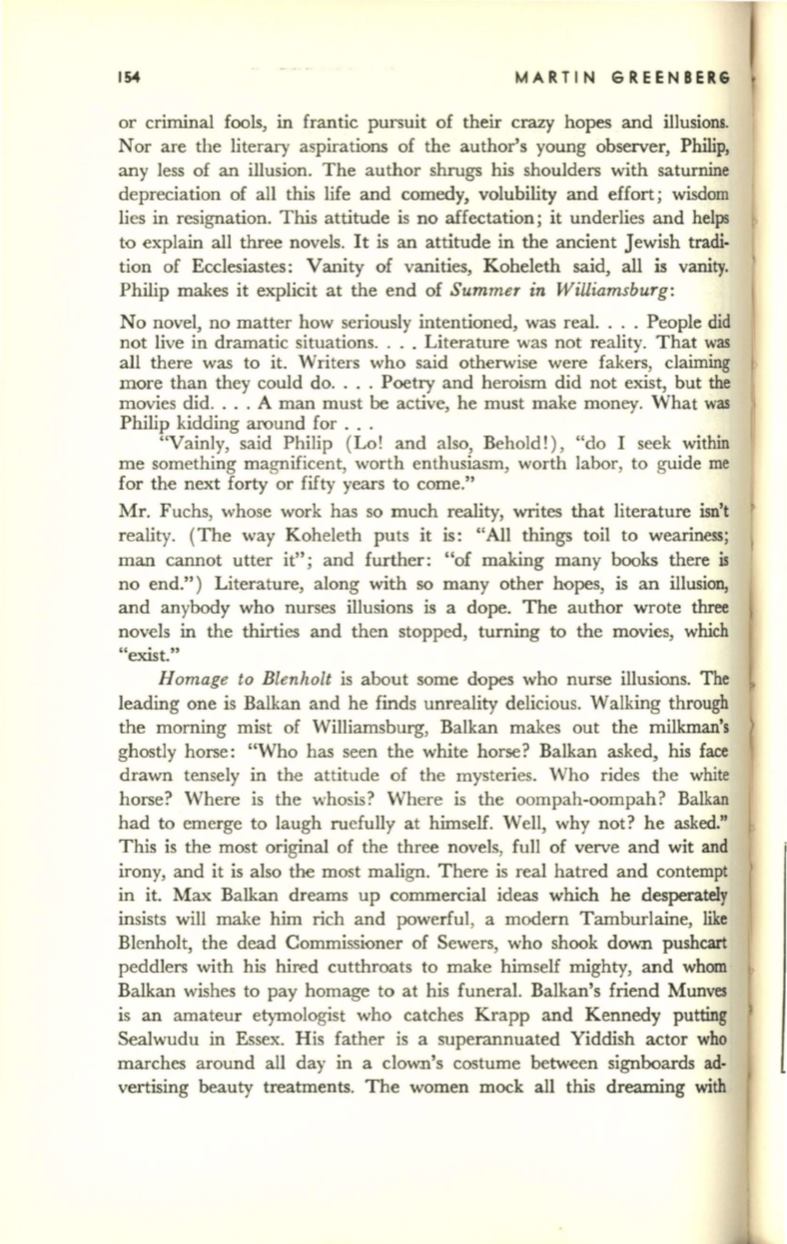
154
MARTIN GREENBERG
or criminal fools, in frantic pursuit of their crazy hopes and illusions.
Nor are the literary aspirations of the author's young observer, Philip,
any less of an illusion. The author shrugs his shoulders with saturnine
depreciation of all this life and comedy, volubility and effort; wisdom
lies in resignation. This attitude is no affectation; it underlies and helps
to explain all three novels. It is an attitude in the ancient Jewish tradi·
tion of Ecclesiastes: Vanity of vanities, Koheleth said, all is vanity.
Philip makes it explicit at the end of
Summer in Williamsburg:
No novel, no matter how seriously intentioned, was real. . . . People did
not live in dramatic situations.... Literature was not reality. That was
all there was to it. Writers who said otherwise were fakers, claiming
more than they could do. . . . Poetry and heroism did not exist, but the
movies did.... A man must be active, he must make money. What was
Philip kidding around for ...
"Vainly, said Philip (Lo! and also, Behold!), "do I seek within
me something magnificent, worth enthusiasm, worth labor, to guide me
for the next forty or fifty years to come."
Mr. Fuchs, whose work has so much reality, writes that literature isn't
reality. (The way Koheleth puts it is: "All things toil to weariness;
man cannot utter it"; and further: "of making many books there
is
no end.") Literature, along with so many other hopes, is an illusion,
and anybody who nurses illusions is a dope. The author wrote three
novels in the thirties and then stopped, turning to the movies, which
"exist."
Homage to Blenholt
is about some dopes who nurse illusions. The
leading one is Balkan and he finds unreality delicious. Walking through
the morning mist of Williamsburg, Balkan makes out the milkman's
ghostly horse: "Who has seen the white horse? Balkan asked, his face
drawn tensely in the attitude of the mysteries. Who rides the white
horse? Where is the whosis? Where is the oompah-oompah? Balkan
had to emerge to laugh ruefully at himself. Well, why not? he asked."
This is the most original of the three novels, full of verve and wit and
irony, and it is also the most malign. There is real hatred and contempt
in it. Max Balkan dreams up commercial ideas which he desperatdy
insists will make him rich and powerful, a modern Tamburlaine, like
Blenholt, the dead Commissioner of Sewers, who shook down pushcart
peddlers with his hired cutthroats to make himself mighty, and whom
Balkan wishes to pay homage to at his funeral. Balkan's friend Munves
is an amateur etymologist who catches Krapp and Kennedy putting
Sealwudu in Essex. His father is a superannuated Yiddish actor who
marches around all day in a clown's costume between signboards ad·
vertising beauty treatments. The women mock all this dreaming
with


